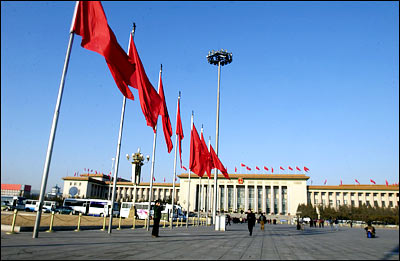 |
The NPC, the highest organ of state power in the PRC, consists
of deputies elected by all the provinces, autonomous regions,
municipalities directly under the Central Government, special
administrative regions and the armed forces. It exercises
legislative power and makes decisions on important issues of
national political life. Its main functions and powers include:
amending the Constitution and supervising the implementation of the
Constitution; enacting and amending basic laws governing criminal
offences, civil affairs, state organs and other matters; examining
and approving national economic and social development plans and
reports on their implementation; examining and approving state
budgets and reports on their implementation; approving the setup of
provinces, autonomous regions and municipalities directly under the
Central Government and deciding the founding and the systems of the
special administrative regions; making decisions on matters of war
and peace; electing and choosing the leadership of the highest
organs of state, i.e., electing the members of the Standing
Committee of the NPC, the state president and vice-president,
deciding on the premier and other members of the State Council, and
electing the chairman and other members of the Central Military
Commission, the president of the Supreme People's Court and the
procurator-general of the Supreme People's Procuratorate. The NPC
has the power to recall any of the above mentioned.
The NPC is elected for a term of five years and usually meets
once a year. When the NPC is not in session its Standing Committee
exercises the highest state power. The NPC Standing Committee is
composed of a chairman, vice-chairmen, a secretary-general and
other members. The current Chairman of the NPC Standing Committee
is Wu Bangguo.